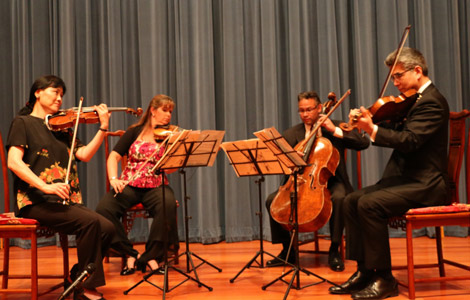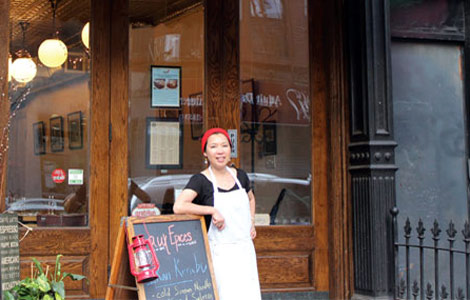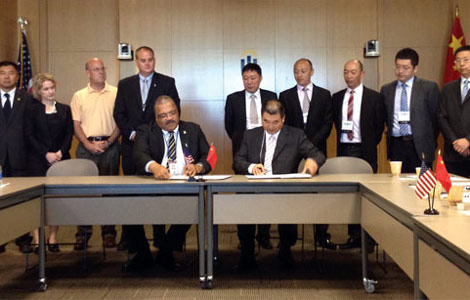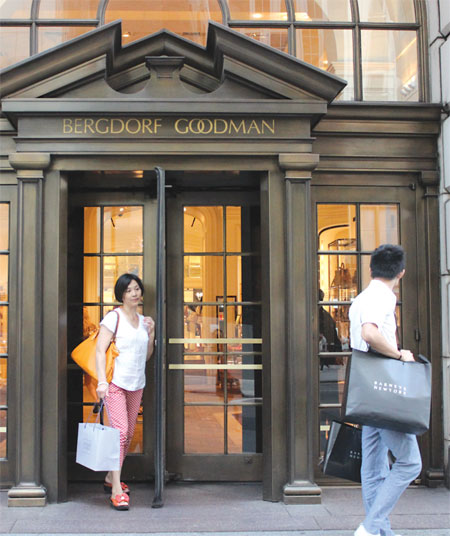Consumers from China prefer niche luxury items
Updated: 2014-07-02 11:18
By Elizabeth Wu in New York (China Daily USA)
|
||||||||
|
Chinese shoppers step outside Bergdorf Goodman on Fifth Avenue in Midtown Manhattan on July 1. Elizabeth Wu / for China Daily |
Chinese consumers are no longer picking up a flashy Louis Vuitton bag and now prefer niche luxury brands, and those who travel to the United States prefer less mainstream stores to "get away from the crowd," according to fashion industry consultants.
"While you still have, and will likely have for many years to come, large groups of luxury buyers attracted to the big luxury brands, we now see a large and growing group of consumers who are shunning these brands in favor of niche players," said Nick Cakebread, managing director at marketing and communications firm BBDO/Proximity Live in Shanghai.
"LVMH is now expanding and marketing Loro Piana, Givenchy, Celine - seen as more niche brands - to the Chinese consumer who may have moved on from flagship LV," Cakebread said.
The growth and emergence of the luxury multi-brand retailer has also helped fuel the growth of newer luxury consumer segments that are shunning traditional big luxury houses and are seeking to discover smaller, niche luxury brands, he added.
This new Chinese consumer is well traveled, knowledgeable, sophisticated and has a clear personal style, said Cakebread.
"They aren't walking into LV and buying five handbags, like the generation before them," he said. Rather, when in New York City they are heading to Barneys to seek new contemporary brands. In London, they shun Harrods but opt for Liberty's and Brown's. In Paris, they may head to Collette and Bon Marche rather than Lafayette.
"Niche luxury brands that tap into people's desire for individuality and self-expression and 'accessible luxury' brands - Michael Kors and Tory Burch. Such brands are seen as the next big winners in China's luxury market as the country's middle class continues to boom," Cakebread said.
"Today's modern Chinese luxury consumer has become equally comfortable shopping at the very top of the pyramid while at the same time experimenting with more avant garde and contemporary designers. This is something which wasn't common even five years ago," he said.
And the fashion experts say many Chinese consumers in the US no longer shop at generic shopping locations and have moved on to less mainstream shopping locales.
"Younger tourists or students, especially in New York, are buying luxury goods off Madison Avenue nowadays, rather than off Fifth Avenue or in Soho. They want to get away from the crowd," said Avery Booker, a partner at China Luxury Advisors based in New York and Los Angeles.
He said smaller stores have made shopping feel more exclusive for these consumers. "They want to enjoy themselves while shopping, rather than the snatch and grab of the past," he said. "Before, the enjoyment of shopping came when people would have the privilege of showing off to their friends. Now the enjoyment happens during shopping."
"For me the development of consumer tastes is more focused around the environment and what happens during shopping," Booker said. "Afternoon tea is becoming more popular in China as well (e.g. shoppers will take some time off and get tea at Bergdorf's in New York) it has become an aspirational part of the shopping experience."
Rather than just following the latest trends, Chinese consumers have become quality-conscious consumers, Sarah Rutson, a buyer at Lane Crawford, one of Hong Kong's high-end department stores, told Vogue magazine. "The Chinese client really understands that craftsmanship and quality are incredibly important, and the two do not always go hand in hand."
Consumers also expect the brand they are wearing to tell a unique story. "Chinese luxury shoppers are hungry for knowledge and place a strong emphasis on understanding a brand's heritage, story, craftsmanship and provenance. Brands that have a compelling story to tell and can live up to customer expectations when it comes to quality have done well," Cakebread said.
"Such consumers are attracted to niche luxury because they seek brands that better reflect their style, personality and taste. Also, they may want to distance themselves from the Chinese 'new rich' that have traditionally bought those brands associated with big logos," Cakebread said.
To Cakebread, the Chinese government's austerity campaign has also been a contributing factor to the rise and success of more subtle, discreet luxury brands.
"Luxury consumers in China are more conscious when it comes to showing their wealth these days. They don't want to be seen with an obviously expensive watch or carrying the latest designer monogram handbag. Instead, if they do buy luxury they look to brands which are less conspicuous. This has been a boon to 'stealth wealth' brands," he said.
For China Daily

 Silicon Valley rally calls on Fox News to fire Beckel
Silicon Valley rally calls on Fox News to fire Beckel
 Look who's two, Xiao Liwu!
Look who's two, Xiao Liwu!
 Philadelphia Orchestra meets the press
Philadelphia Orchestra meets the press
 Chinese, US naval hospital ships conduct exchange
Chinese, US naval hospital ships conduct exchange
 High rent pressures NYC Asian eateries
High rent pressures NYC Asian eateries
 Artists advocate for environmental protection
Artists advocate for environmental protection
 Wichita, Kansas to Xi'an, China: Come fly with us
Wichita, Kansas to Xi'an, China: Come fly with us
 Amateur team aims for great heights
Amateur team aims for great heights
Most Viewed
Editor's Picks

|

|

|

|

|

|
Today's Top News
Ex-security chief Zhou Yongkang under probe
Microsoft probed for monopoly
4 charged for murdering student
Prudence urged over solar dispute
Baidu developing 'self-driving' car
US visa delays likely to continue
McDonald's fishing for supplier
OSI group to fund food safety
US Weekly

|

|







